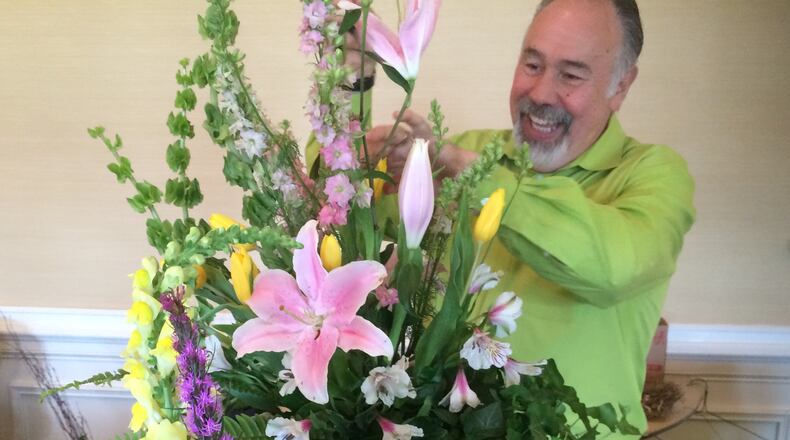Take a look at this pretty arrangement but be warned: among these familiar blooms is a variety that can attack your fingernails.
K. Mike Whittle , florist extraordinaire, gave a presentation at the Marietta Country Club today, during the Junior League of Cobb Marietta's Sustainer Luncheon. Mike told lots of great stories, like how he got his start at 13 when he would fish cattails out of the retention pond near his house in Smyrna, and sell them to a local florist.
He also imparted some harrowing information about a flower commonly used in floral arrangements. Which one?
The dastardly Alstroemeria! Never strip its leaves or whittle its stem using your fingernail, Mike warns. (He uses a knife, rather than scissors, using quick, clean motions).
Here's why:
Credit: Getty Images
Credit: Getty Images
Whaaaat? I looked into this, courtesy of the "Occupational Skin Diseases" section of the International Labour Office's Workplace and Safety Information site. Riveting reading, by the way. Here's a sample:
"Cutaneous defence systems are effective only within limits. Anything which breaches one or more of the links endangers the entire defence chain. For example, percutaneous absorption is enhanced when the continuity of the skin has been altered by physical or chemical injury or by mechanical abrasion of the keratin layer. Toxic materials can be absorbed not only through the skin, but also through the hair follicules, sweat orifices and ducts. These latter routes are not as important as transepidermal absorption."
Right. Anyway, so embedded in all this is a list of potentially toxic substances, and Alstroemeria is on it. The University of California's Safe and Poisonous Garden Plants guide lists it as well.
The UC guide lists lots of other stuff too, and after a few minutes of scrolling you will be convinced your entire garden is trying to kill you. (Apple seeds are majorly toxic and can cause serious illness or death? Oh.)
Alstroemeria is considered to have minor toxicity, meaning eating it can make you sick, and contact, the site warns, can cause "a skin rash or irritation. Wash the affected area of skin with soap and water as soon as possible after contact. The rashes may be very serious and painful. Call the Poison Control Center or your doctor if symptoms appear following contact with the plants."
According to Whittle you may need a bandage, too.
"This has an acid it in and it will actually eat your fingernail off," he said.
Alstroemeria could hardly be more common. Also known as Peruvian lilies, they're a staple of professional floral arrangements. They come in lots of pretty colors, have sturdy foliage and last a long time. That might be why restaurants love to use them as decor; they don't have be changed frequently.
So don't fret. Just carefully snip their stems with scissors or a knife, and enjoy that lovely arrangement!
About the Author
Keep Reading
The Latest
Featured




